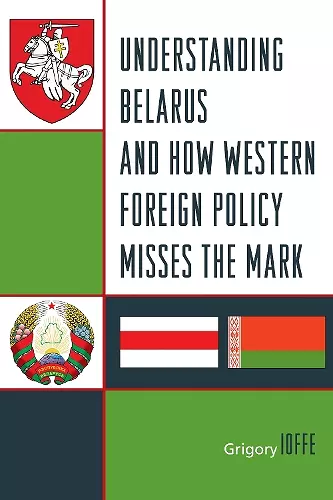Understanding Belarus and How Western Foreign Policy Misses the Mark
Format:Paperback
Publisher:Bloomsbury Publishing PLC
Published:6th Aug '14
Currently unavailable, and unfortunately no date known when it will be back
This paperback is available in another edition too:
- Hardback£117.00(9780742555587)

In the West, Belarus is generally thought of as "the last dictatorship in Europe." However, this political stereotype neglects the roots of the country's identity—or identity crisis. In this fascinating study of unfinished nation-building in Belarus, Grigory Ioffe draws on his two dozen research trips to the country to trace Belarus's history, geography, political situation, society, and economy. The book highlights rapid economic growth in post-1996 Belarus and the underpinnings of the country's political landscape. The United States has ostracized official Belarus since the mid-1990s and has repeatedly condemned President Lukashenka's undemocratic ways. However, his presidency has been stable since 1994, and since 2002 he has been successfully reshaping himself from an unabashed Russophile into a kind of Belarusian nationalist. Nevertheless, the Belarusian nation is not yet a defined entity—many Belarusians are not yet certain as to what sets them apart from Russians, and a multiplicity of national projects hinders national consolidation and deters nation-building. Ioffe pays particular attention to the current linguistic situation, in which Russian, rather than Belarusian, is the language of the majority. The ambivalent relationship between Russia and Belarus results in an identity crisis that is not understood by the West, which leads to Western policies toward Belarus that are based on a fallacy of geopolitical thinking. Based on Belarusian- and Russian-language sources along with the author's personal observations, this book will lead readers to a deeper understanding of Belarus, its relationship with Russia, and its still-forming national identity.
The scholarly component in this volume is impressively high, making it perhaps the best study in English of a little-known and under-researched country. . . . [Ioffe] bears an immense knowledge of things Belarusian . . . [and] he sheds much needed light on the polity, economy, and society actually obtaining in [Belarus]. * Eurasian Geography and Economics *
An important and timely book, articulating topical and emerging issues in Belarusian studies. . . . [Ioffe] takes a critical look at the established views on such issues as Belarusian identity, language use (Belarusian versus Russian), relations with Russia (unification versus independence), Aliaksandar Lukashenka as a political figure (the reasons behind his genuine popularity among his people and his rejection by the west, despite the west’s acceptance of some much less democratic Central Asian leaders), the growth of the Belarusian economy . . . and, finally, the projections for the opposition. . . . [A] carefully researched and significant book that tries 'to understand Belarus on its own terms.’ * Slavic Review *
Effortlessly captivates a much broader audience and essentially calls 'well-known truths’ about the country into question. Understanding Belarus is a book about challenging facts, challenging qualifications and polemic conclusions, a book that touches one personally. . . . It craftily weaves together Belarus’ complicated domestics with its foreign relations, in addition to critically assessing the logic of international society. . . . Ioffe successfully manages to turn Belarus’ regime 'inside-out’ to expose its sui generis logic of survival that responds to the often inflexible politics of great powers. * Nationalities Papers *
Grigory Ioffe's thorough and extremely insightful study . . . provides a balanced, well-structured and information introduction to the nature of nation-building and the political regime in contemporary Belarus. * Europe-Asia Studies *
Grigory Ioffe’s Understanding Belarus and How Western Foreign Policy Misses the Mark is a profound, learned book that will force the reader to question the conventional dogmas about the meaning of democracy in post-Soviet space. Lucidly written, carefully researched, and extraordinarily insightful about the unique dynamics of emerging Belarusian nationalism, this book is a must-read for any scholar of Belarus or post-Soviet countries. -- Ilya Prizel, University of Pittsburgh
Grigory Ioffe set as his goal to create a 'less ideological and more open approach' to an understanding of the history, politics, social system, and economy of Belarus. He has succeeded in producing a persuasive alternative to the well-known earlier interpretations by Jan Zaprudnik and David Marples. Ioffe’s main focus is on the search for Belarusian identity and an explanation of its peculiar relationship to Russia both historically and contemporaneously. Belarus remains for most of us dimly illuminated and something of an enigma. Good policy toward Belarus needs to be founded on a solid understanding, which Grigory Ioffe has provided in this very useful volume. -- James R. Millar, The George Washington University
Grigory Ioffe is perhaps our most insightful analyst of contemporary Belarus, and this is a distinguished study that brings together the insights of first-hand experience and the wider concerns of social science. In particular, this is a study that allows him to explore at length the complex nature of the identity of a small European nation that has historically been torn between East and West. All who are interested in the future of European politics as well as the development of the former Soviet republics will want to read this rich and provocative analysis. -- Stephen White, University of Glasgow
ISBN: 9781442242128
Dimensions: 230mm x 153mm x 18mm
Weight: 395g
286 pages